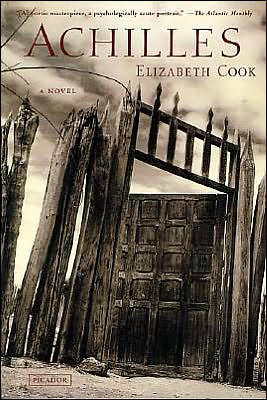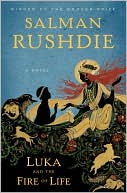Achilles
Born of god and king and hidden as a girl until Odysseus discovers him, Achilles becomes the Greeks’ greatest warrior at Troy. Into his story comes a cast of fascinating characters—among them Hector, Helen, Penthiselaia the Amazon Queen, and the centaur Chiron; and finally John Keats, whose writings form the basis of a meditation on the nature of identity and shared experience. Achilles is an affirmation of the story’s enduring power to reach across centuries and cultures to the core of our...
Search in google:
Born of god and king and hidden as a girl until Odysseus discovers him, Achilles becomes the Greeks’ greatest warrior at Troy. Into his story comes a cast of fascinating characters—among them Hector, Helen, Penthiselaia the Amazon Queen, and the centaur Chiron; and finally John Keats, whose writings form the basis of a meditation on the nature of identity and shared experience. Achilles is an affirmation of the story’s enduring power to reach across centuries and cultures to the core of our imagination.San Francisco ChronicleCook imbues the legend of Achilles with startling urgency and beauty. Erudite, passionate and not the least bit pretentious... Cook has impressively transformed the legend of Achilles into something entirely her own, a thoroughly modern study of masculinity, mortality and honor.
Two Rivers1Gone59Relay93Glossary of Classical Names109
\ From the Publisher“This book is a tiny treasure....If, as they say, every generation demands its own translation of Homer, Cook brings us here a Homer for the MTV generation.” —Slate.com\ “Everything in this novel, except the number of pages, is larger than life, and in reading it we are returned to our own lives with a sense of larger possibility. This bright, fierce book reminds us that, however grievous, however inevitable our losses, we do not bear them alone.” —Boston Sunday Globe\ “This forceful re-creation of the life of Achilles sacrifices nothing to modernity....At the same time, this brief, intense novel is unmistakably modern in intent.... Fragments of keen, almost carnal prose have the cumulative effect of a requiem.” —The New Yorker\ “[A] poetic masterpiece, a psychologically acute portrait... Achilles is also unfailingly modern: swift, cinematic, sexually explicit, and ravishingly beautiful.” —The Atlantic Monthly\ \ \ \ \ \ Margot LiveseyEverything in this novel, except the number of pages, is larger than life, and in reading it we are returned to our own lives with a sense of larger possibility. This bright, fierce book reminds us that art can be consoling and that, however grievous, however inevitable our losses, we do not bear them alone. \ — The Boston Globe\ \ \ The Atlantic Monthly[A] poetic masterpiece....unfailingly modern: swift, cinematic, sexually explicit, and ravishingly beautiful.\ \ \ \ \ San Francisco ChronicleCook imbues the legend of Achilles with startling urgency and beauty. Erudite, passionate and not the least bit pretentious... Cook has impressively transformed the legend of Achilles into something entirely her own, a thoroughly modern study of masculinity, mortality and honor.\ \ \ \ \ BooklistInspired...Cook points up the primal quality of Achilles' story, so that we see its tragedy...as utterly universal.\ \ \ \ \ Publishers WeeklyWith this brilliantly conceived retelling of the plight of one of Homer's heroes, British writer Cook demonstrates the same skill that has made her poetry and examinations of Renaissance literature so wonderfully memorable. Cleaving closely to the Odyssey but embellishing her tale with sharply imagined creative flourishes, Cook navigates the rise and fall of the powerful Greek warrior Achilles, tragic hero of the Trojan War. Voluptuously chronicling the warrior's youth, Cook tells how he is dipped in the immortalizing waters of the river Styx (except for the legendary heel) and spends his youth cloaked as a girl. As he rises to power, Achilles encounters a bevy of gods and mystical figures, each imparting ruminations on fate, mortality and the tragic eventualities of love and war. Death the slaying of Troy's champion soldier, Hector; the 12 gruesome days spent parading his corpse via chariot; and Achilles' own demise is the work's central theme, but Cook also brilliantly narrates a series of passionate encounters, describing, for example, the exquisitely athletic fusion of King Peleus and Achilles' sea-nymph mother, Thetis. Cook's text is more lush prose poem than traditional narrative, its concentrated, intense verbiage exhibiting agony and beauty simultaneously. The heady brew is made even richer by Cook's brave incorporation of an episode from the life of poet John Keats in the surprising final chapter, which suggests a curious affinity between the prophetic writer and the slain hero. At 128 pages, Cook's tale is tightly woven, and this brevity makes for an extreme reading experience. The genre of retellings of classical epics will surely be reinvigorated by this slim, exceptional interpretation of the heroic fable of Achilles. (Feb.) Forecast: Rave reviews in Britain heralded the appearance of this potent work, and curiosity on these shores should be whetted by the book's haunting jacket, which features a massive ancient wooden gate in stark black and white. Copyright 2001 Cahners Business Information.\ \ \ \ \ New YorkerThis forceful re-creation of the life of Achilles sacrifices nothing to modernity: gods mate violently with mortals, ghosts feast on sheep's blood, and Achilles rages and slays, unburdened by psychology. At the same time, this brief, intense novel is unmistakably modern in intent, turning a war epic into a meditation on the limits of human perfectibility. Fragments of keen, almost carnal prose have the cumulative effect of a requiem: in Hades, the dead resent the living, who are always eating, "their tongues fossicking among the bones"; on the battlefield, Achilles greets Hector with the words "We meet as animals," and his enemy sees "his life spread out before him like a giant sheet in the sun."\ \ \ \ \ Kirkus ReviewsBritish writer and scholar Cook offers up an inconsistently satisfying curiosity in this little slip of a debut novel retelling the story of Achilles' life. At times the author catches an effect that's just right-that vivifies, that is, or expands in new words the reader's impression-memories of the classics themselves, mainly the Homeric epics. What it's like for Achilles in the Afterworld, for example (this just before the still-living Odysseus visits him): "You know the living are up there, driving your horses, ploughing your fields, handling your bowls. Eating. The living are always eating; their tongues fossicking among the bones"). Less satisfying, though, is her unimaginative decision to adhere to a narrative view of the gods as "magic" beings, as in the story of Achilles' birth, when Thetis dips him in the Styx ("‘Immortality,' she said, ‘I'm burning away [his] mortal parts in the fire of this river'"). One craves not such schoolroom retellings but descriptions instead of real people and of the actual human traits that gave rise to the myths. And yet, when she does try doing it this way, Cook often limps and loses her ear, as in her implying of Helen's beauty by berating the craven beastliness of the men who lust for her ("their cheers were in Paris' ears as he fucked her. He needed others to want her to want her"). Achilles' youthful sexual joining with Deidamia is more successfully told, as is his deadly encounter with Penthiseleia, the Amazon queen. Possibly most captivating is the chapter on Chiron, the wise centaur. The closing section-about Keats's aesthetic-emotional relatedness to antiquity-is quite beautifully done, though it remains more envoi than part of the whole-andeven here one's sense of being in capable poetic hands is shaken by Cook's curious way elsewhere in the book of resorting to absurdly blunt effects like "AAAAAIIIIIIIEEEEEE!!!" or "QUICK! / CLOSE THE GATE. ACHILLES IS COMING." A mix.\ \








